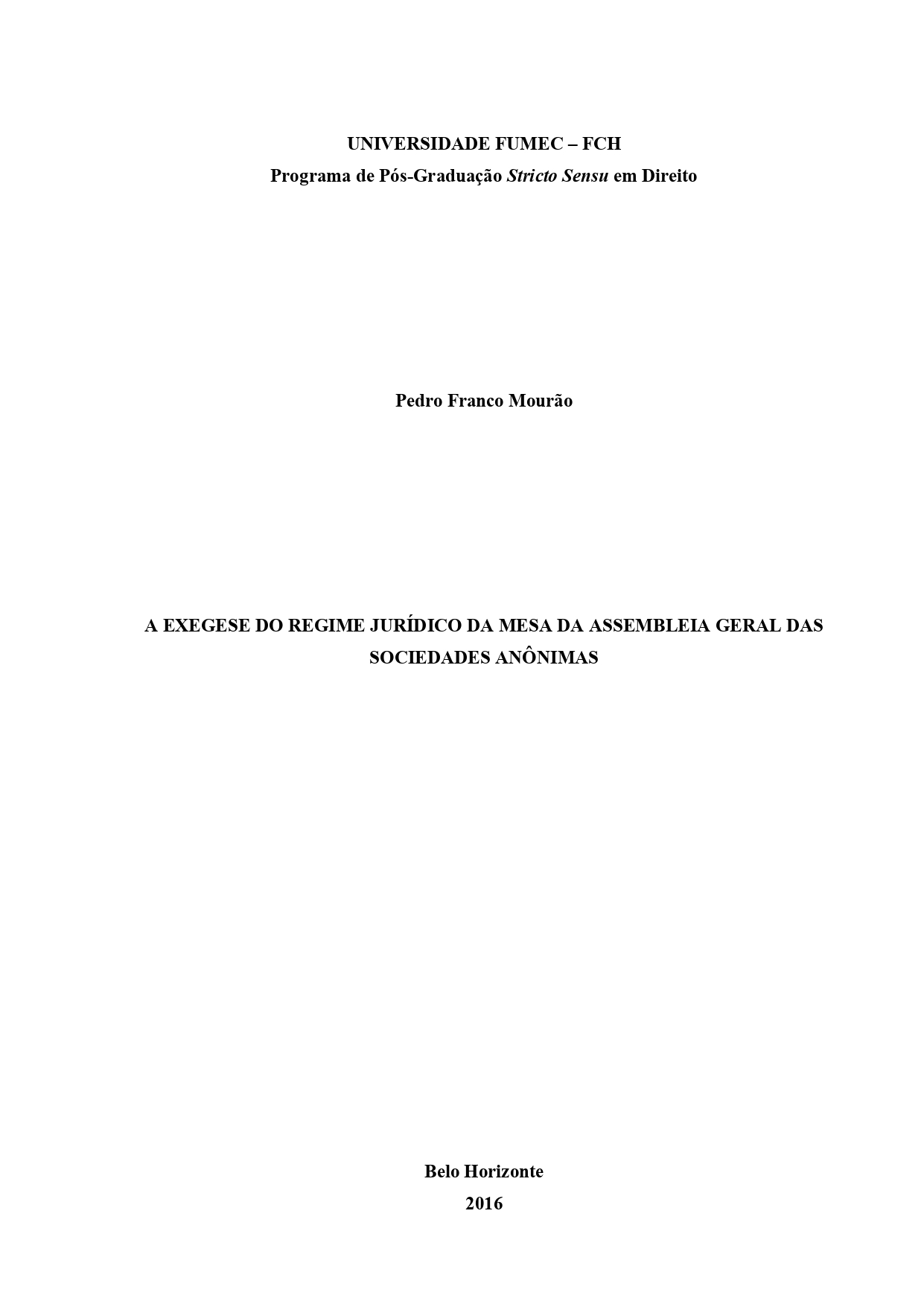A exegese do regime jurídico da mesa da assembleia geral das sociedades anônimas

Visualizar/
Data
2016Autor
Mourão, Pedro Franco
xmlui.mirage2.itemSummaryView.MetaData
Mostrar registro completoResumo
A assembleia geral é considerada o órgão supremo das sociedades anônimas, tendo em vista se
tratar da instância em que são tomadas as principais decisões para que seja exercida a vontade
da companhia. Referidas decisões são tomadas por deliberações, cuja base é o voto proferido
pelos acionistas, seja mediante a vontade da maioria (quórum simples ou qualificado) ou, até
mesmo em certos casos, pela unanimidade. Com o intuito de conferir organização às reuniões,
a Lei das Sociedades Anônimas (Lei nº 6.404/76) prevê que a assembleia geral deve ser
conduzida e dirigida por uma mesa, composta por presidente e secretário. Embora exista tal
previsão e o tema seja relevante, a legislação brasileira é bastante precária, tratando da mesa,
bem como das funções, poderes, responsabilidades e direitos de seus membros em
pouquíssimos dispositivos, o que prejudica a prática empresarial e causa insegurança jurídica.
A doutrina sobre a matéria ainda é escassa. Por esse motivo, é realizado um estudo a respeito
da mesa da assembleia geral, destacando as funções, responsabilidades e direitos da mesa, bem
como de seus membros. O objetivo é demonstrar que, no sistema brasileiro, a mesa não possui
autonomia necessária para tomar decisões importantes na condução das atividades do órgão
supremo, sendo nada mais que mera delegada da assembleia geral, devendo seus membros, na
grande maioria das vezes, submeter questões como expulsão de acionistas, alterações na pauta
da ordem do dia, entre outras, para serem decididas em votação dos acionistas na assembleia
geral. Demonstrar-se-á, nesse rumo, que o regime jurídico brasileiro peca pela omissão, ao
passo que o regime português é bem mais avançado, sendo necessário repensar e reavaliar a
legislação pátria e as situações que envolvem a matéria. Entretanto, antes de tratar
especificamente sobre o tema da mesa, se realizará um estudo sobre o funcionamento integral
da assembleia geral, destacando as competências, matérias, forma de convocação, deliberações,
invalidação das deliberações, entre outros assuntos relevantes. The general meeting is considered the supreme organ of corporations in order to treat the place
where they are taken key decisions to be carried out the will of the company. Decisions are
taken by deliberations, whose base is the vote cast by the shareholders, either through the will
of the majority (simple or qualified quorum) or, even in certain cases, by unanimity. In order to
give the organization the meetings, the Corporate Law (Law No. 6.404/76) provides that the
general meeting should be conducted and managed by a board consisting of president and
secretary. Although there is such a prediction and the subject is relevant, Brazilian legislation
is quite poor, treating the board as well as the duties, powers, responsibilities and rights of its
members in very few devices, which undermines the business practice and causes legal
uncertainty. The doctrine on the matter is still scarce. For this reason, a studyregarding the
general meeting has been conducted, highlighting the roles, responsibilities and rights of the
board, as well as its members. The goal is to demonstrate that, in the Brazilian system, the board
does not have autonomy to make important decisions in the conduct of the supreme body of
activities, being nothing more than mere delegate of the general meeting, should its members,
in most cases, to refer questions as expulsion of shareholders, changes in the agenda of the
agenda, among others, to be decided by vote of the shareholders at the general meeting. It will
be demonstrated in this way that the Brazilian legal system suffers from omission, but on the
other hand, the Portuguese legal system is far more advanced, being necessary to rethink and
reassess the Brazilian legislation and situations involving the matter. However, before dealing
specifically on the subject of the board, there will be a study of the full operation of the general
meeting, highlighting the skills, materials, form of summons, decisions, invalidation of the
proceedings, among other relevant issues.
